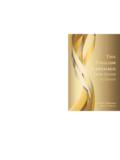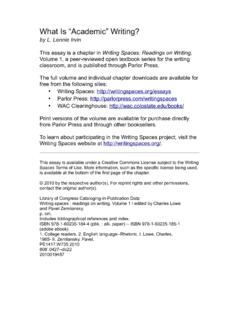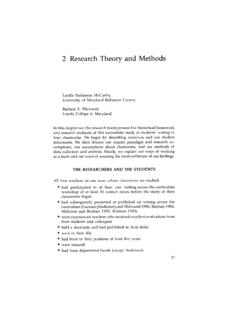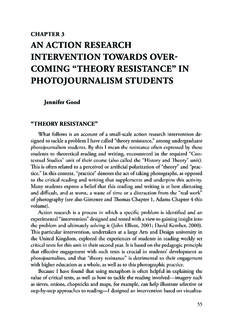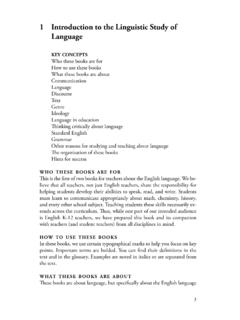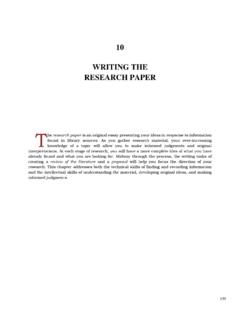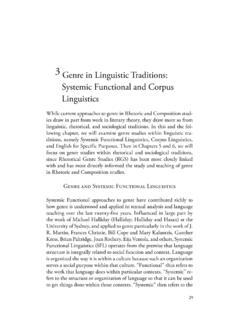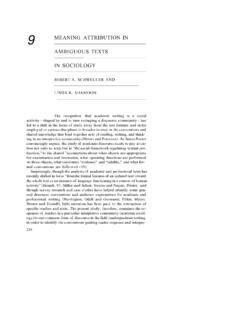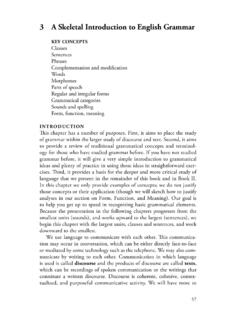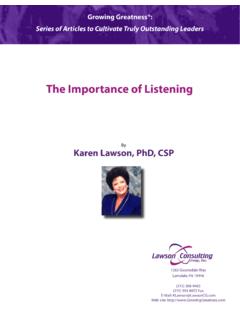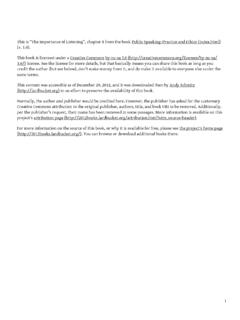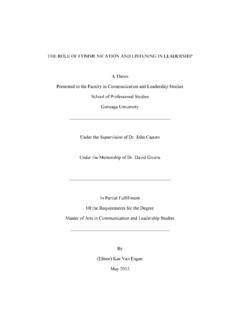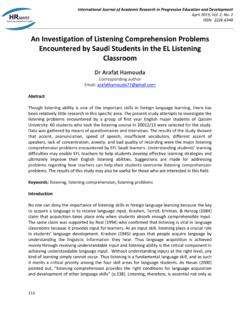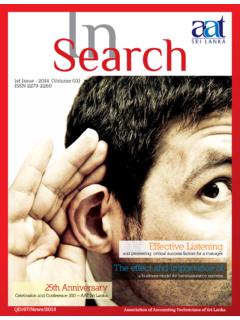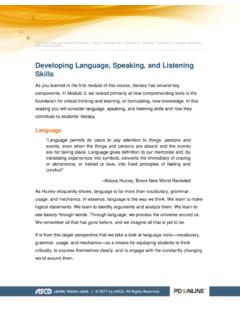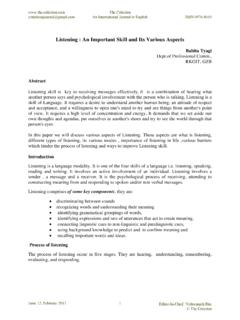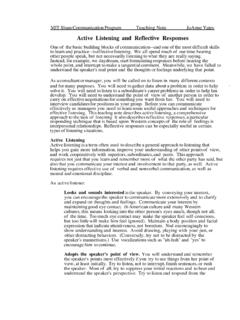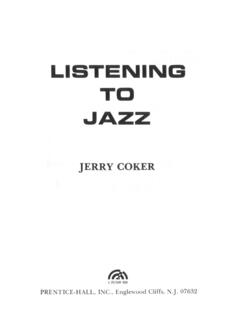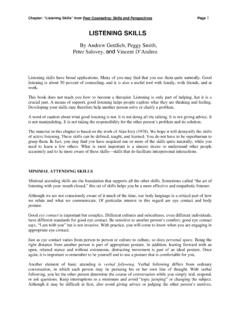Transcription of Irene Lurkis Clark LISTENING AND WRITING
1 Irene Lurkis Clark LISTENING AND WRITING Successful writers do not simply express thought but transform it in various ways for the needs of the reader. Whereas oral discourse "normally takes place in an actual situation that provides abundant non linguistic clues to the speaker's intended meaning,"I written discourse, by contrast, depends upon supplying a sufficient context for interpretation in the absence of the contextual clues found in ordinary speech, a context which is determined by the conventions of code and audience. This eccentricity of written discourse creates problems which cannot be solved even by the ablest of native speakers without practice and instruction and which often prove insurmountably difficult for students lacking sufficient experience in reading and WRITING .
2 One method, however, whereby students can learn to focus upon the concept of the audience, a method which has not yet received a great deal of attention, is to provide them with the opportunity of not only reading their own discourse, but of LISTENING to it as well. LISTENING to their own WRITING as well as to that of their classmates enables student writers to cultivate a necessary detach ment from their own WRITING and an imaginative attention to audience. Such a technique can benefit college student writers at all levels and is particularly useful to disadvantaged writers, who often experience severe difficulty in establishing an adequately developed context for their written discourse in the absence of actual audience feedback.
3 Many beginning college writers produce what Linda Flower calls "writer-based prose," which she defines as an "unretouched and Irene Lurkis Clark is Direct or of the WRITING Laboratory at the University ofSOUl hem California. She is l'Urrently working on a book. Dialogue in the WRITING Confe rence: A Method of Training Teachers and Tutors. for N CT . Her articles have appeared ill the WRITING Center Journa l. Notes and Queries. and Teaching English in the Two-Year College. t Hirsch. The Philosophy of Composition (Chicago and London: Univers ity o f Chicago Press. 1977). p. 21. 81 underprocessed version"2 of the writer's own thought, and which may be differentiated from "reader-based prose," which presents a deliberate attempt to communicate something to the reader, using a shared language and context between writer and reader.
4 Writer-based prose, familiar to all teachers of composition, is characterized by "the absence of expressed causal relations and the tendency to express ideas without proof or development,"J characteristics which Mina Shaughnessy identifies as descriptive of the composition of basic writers. Shaughnessy cites evidence "in Basic WRITING papers of the egocentricity of the apprentice writer, an orientation that is renected in the assumption that the reader understands what is going on in the writer's mind and needs, therefore, no introduction or transitions or explanations."4 College classrooms at all levels are filled with writers who have not learned to move away from writer-based prose into a public reader-based expression.
5 Writer-based prose shares many of the features of the egocentric speech used by the developing child. In studying the emerging thought of children, both Vygotsky and Piaget observed a mode of speech which seemed to have little social or communicative function . In Vygotsky's synopsis of Piaget's theory, "In egocentric speech, the child talks only about himself, takes no interest in his interlocutor, does not try to communicate, expects no answers, and often does not care if anyone listens to him ."1 According to Piaget, the child's non-communicative or egocentric speech is a renection not of selfishness, but of the child's limited ability to assume the point of view of listener.
6 ~ Similarly, one may say that writer-based prose has nothing to do with discourtesy or selfishness but is a renection of the student's inability to assume the point of view of reader. Of course. we encourage students to become their own readers and to reformulate discourse by the process of revision. Few writers are capable of finding and formulating their full meaning in a first draft of a discourse, no matter how much time they devote to the prewriting stage. 2 Linda F lower. "Writer-based Prose: A Cog nitive Bas is for Problems in WRITING ."Co liege English. Vol. 4. No . I (September. 1979). J Flowe r. p. 27 . 4 Mina Shaughnessy.
7 Errors and Expectations (New York: Oxford University Press. 1977). p. 240. 'Lev Semenovitch Vygotsky. Thought and Language. trans. Eugenia Hanfmann and Gertrude Vakar (Cambridge. Mass.: MIT Press . 1962). p. 15. "Herbert Gins berg and S ylvia Oppe r. Piagl'l S Theory o/,lnrelll'cHial De"elopmelll (Englewo od C liffs. Nc" Jersey: Prentice Hall. 1969). p. 89. 82 It is usually during the second stage of the composing process. the revising stage, that meaning clarifies and deepens. However, as all composition teachers know. merely urging students to revise often proves to be of little use, even if we reward revisions with higher grades.
8 Beginning writers, in particular, are often unable to maintain sufficient psychological distance from their own discourse in order to detect when the stated meaning does not match the intended meaning and therefore cannot know when to add. substitute, reorder or restate. This perceptual blindness is particularly acute when students begin rereading their work immediately after they have written a first draft; they fully recall and read into their texts all their unexpressed semantic intentions. Furthermore. the process of revision imposes an additional difficulty on disadvantaged students in that it requires that they read perceptively, an ability which many college students simply do not have.
9 Skillful revising implies skillful. that is, critical, reading. but unskilled writers are often unskilled readers as well. John Butler points out, Ont: thing w~ know about remedial writers is that most of them are also remedial readers. What is often forgotten .. is that such a person is a poor reader not .lust of essays. stories. poems. and so on. but of his teacher's comments. 7 To ask them to re-read their own prose for the purpose of revising it is to impose a task that is doubly difficult. Revision for such writers is often merely a "hit and miss" procedure-the correction of a few misspelled words, a half-hearted sprinkling of commas.
10 No real reformation occurs. Substantive revising can occur, however, through the process of LISTENING , which can take place either in the classroom, during office conferences, or in a LISTENING center located in the WRITING lab. In a setting which stresses the importance of LISTENING , students can read their drafts aloud to one another and gain the benefit of immediate audience feedback. Comments such as "Wait, I didn't understand that section," or "What do you mean by that?" help students realize that what they intended to say may not actually be written in their early drafts. Moreover, when students gain experience in commenting on one another's work, they acquire greater insight into their own efforts.
